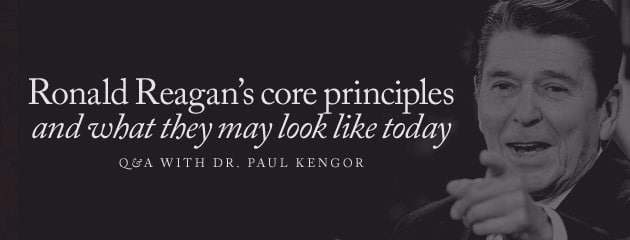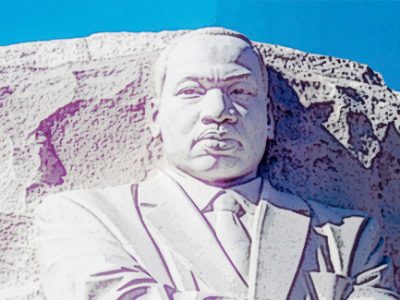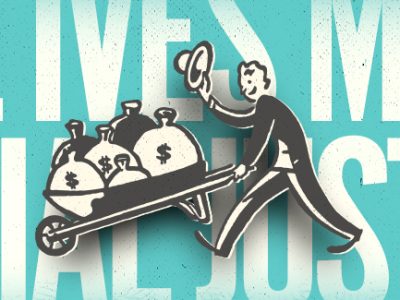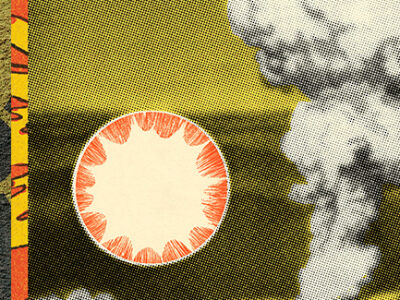
Editor’s note: A version of this Q&A was first published in the Values & Capitalism Blog of the American Enterprise Institute.
V&C: How did you decide upon these 11 qualities to encapsulate what it means to be a Reagan conservative?
Kengor: I guess I’d have to say that they’re simply the product of a bunch of books, a ton of articles and many years of research on Ronald Reagan, not to mention the subject of conservatism. I literally can’t say how many articles I’ve written or speeches I’ve given on Reagan. This is my fifth book on Reagan since 2004, and my next two books will also be on Reagan, one of them is a Harvard University Press work that I’m co-editing and which we hope to have published by next year. I’ve spent probably six summers at the Reagan Library.
My point is that amid all of that legwork, when I sat down to try to conceive a list of principles of Reagan conservatism—which I did for a conference on conservatism hosted by the Center for Vision & Values at Grove City College—I ultimately came up with 11 principles.
It took some time to finalize those 11. I originally had a list of seven. As people heard the talk and invited me to give it elsewhere, including at CPAC in 2012, I slowly came up with a few more as I dug deeper into the concept. I ended up with 11 principles. Some people told me I should make it an even dozen, or cut one and combine two and have an even 10, but 11 is what I came up with. It’s not a magic, infallible number, but hopefully the list is comprehensive and I’m not neglecting anything big.
V&C: In the book, you described Reagan as an eternal optimist. How do you think he would respond to our current political and economic issues? Would he still describe America as a “Shining City on a Hill”?
Kengor: That’s a great question. Reagan once said:
I know it’s often said of me that I’m an optimist. Over the years, I’ve been described as an inveterate optimist, an eternal optimist, a reflexive optimist—a born optimist, a canny optimist, a cagey optimist—even as defiantly optimistic. It just goes to show there’s no word that cannot be turned into a pejorative if the pundits work hard enough at it.
That being the case, who I am to say that Reagan wouldn’t still be optimistic?
That said, I consider myself a Reagan conservative but I don’t have Reagan’s inveterate optimism right now. Economically, the country can be turned around, but culturally, it’s a disaster. And it’s only going to get worse as the culture becomes more militantly secular and hostile to religious people. Religious progressivism was and is something that conservatives can learn to work with, because religious progressives shared not only our faith and hope, but also had charity—the three theological virtues. Secular progressivism, however, is another animal. Secular progressives do not share our faith and certainly not our charity, or our commitment to religious freedom. They are hostile to many of our religious values and even our right to express them. Just look at how they’re currently treating and targeting Christian bakers or florists or photographers who, invoking their faith, ask not to be compelled to provide services for a same-sex wedding ceremony. They sue them. They demonize them. They seek to put them out of business. In some cases, they’re even ready to jail them. There’s no charity there, and there’s no tolerance.
In a speech on religious tolerance given in Dallas 30 years ago, Reagan said: “I submit to you that the tolerant society is open to and encouraging of all religions. And this does not weaken us; it strengthens us, it makes us strong… Without God, there is no virtue, because there’s no prompting of the conscience. Without God, we’re mired in the material, that flat world that tells us only what the senses perceive. Without God, there is a coarsening of the society.”
The refusal by today’s secular progressives and liberals—who, ironically, preach tolerance and diversity—to permit religious believers to practice their religious beliefs as they please is absolutely coarsening society.
Genuine tolerance doesn’t mean simply tolerating things you agree with.
Something else concerns me in this regard. Ronald Reagan also believed that America—that Shining City—would be sustained over time by common values taught at home by parents to their children in their families. I go through that in this book, specifically the section on the family. Unfortunately, not only are American families falling apart today, but there aren’t even common values that those families and parents share. The common Judeo-Christian values that this country long shared are being angrily rejected.
Reagan was the eternal optimist, but I’m not. He grew up in a totally different America. Would he still be optimistic? I can’t say he wouldn’t, but he would certainly be shocked by the rapid decline of the culture, faith and our common values.
V&C: How would Reagan’s policies or attitude have been different, if at all, without the presence of an arch rival like the Soviet Union?
Kengor: That’s another good question. I don’t know about his “attitude,” but certainly his policies—namely, his foreign policy—would have been different. Much of what defined Reagan was his intense anti-communism, another of the principles I lay out in the book. His anti-communism and his position on the Soviet Union was the glue that held together a big tent Republican Party in the late 1970s and throughout the 1980s. It also attracted many Democrats to Reagan’s side—the so-called Reagan Democrats. When the Cold War ended, the Republican Party lost that tie that binds. For a while, it looked like radical Islam might replace anti-communism in that respect, but it hasn’t—at least not in the same way.
V&C: How do you think Reagan would respond to the international threats facing the United States today, such as terrorism or conflict in the Middle East?
Kengor: I’ve been asked many times if Ronald Reagan would have sent troops into Iraq or Afghanistan. I imagine he surely would have sent troops into Afghanistan immediately after 9/11. I can’t imagine any president who would not have—Republican or Democrat, liberal or conservative, George W. Bush or Al Gore. Iraq is another story.
In truth, for all his hawkish reputation, his peace-through-strength rhetoric and his strong words directed at the Soviet Union and other enemies, Ronald Reagan very rarely used military force. He believed in military strength to ensure peace, to guarantee that the military wouldn’t be needed in the first place. When he did use force, it was short and quick and successful, such as Grenada in October 1983 and Libya in April 1986.
Interestingly, George W. Bush, in a remarkable November 2003 speech to the National Endowment for Democracy, invoked Ronald Reagan’s “March of Freedom,” which Reagan laid out in his historic June 1982 Westminster speech. Bush aimed to extend Reagan’s March of Freedom from the freed former communist world into the unfree Middle East, the part of the world “most immune” (as Bush put it) to this “freedom tide” pushed by Reagan. Bush saw himself as extending Reagan’s vision in that respect, albeit to a new corner of the world. Bush correctly cited Reagan in noting that he, like Reagan, believed that freedom was a universal aspiration, regardless of ethnicity, geography, or religion. Bush believed that Muslims, too, longed to be free—to vote, to have free speech, to have a free press, to freely practice their faith.
But does that mean that Reagan likewise would have invaded Iraq in 2003 to pursue a freedom project there as the next “natural” step in this historic March of Freedom? It’s possible, but we can’t say so definitively. I wouldn’t try to.
The freedom cause of Ronald Reagan’s long life was not the battle against militant Islam but the battle against atheistic communism.




